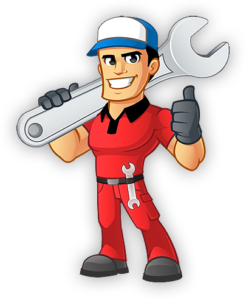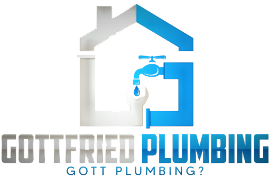
No More Blockages: Fixing Completely Clogged Drains Once and for All

Introduction
Dealing with clogged drains can be a frustrating and messy experience. Whether it's a slow drain or a completely blocked one, it can disrupt your daily routine and cause unnecessary stress. But fear not, because in this article, we will explore the various causes of clogged drains and provide effective solutions to fix them once and for all. So say goodbye to those pesky blockages and hello gottfriedplumbing.com to smooth-flowing drains!
No More Blockages: Fixing Completely Clogged Drains Once and for All
Clogged drains are a common household problem that can occur in any part of your plumbing system. From the kitchen sink to the bathroom shower, no drain is safe from potential blockages. When left unattended, these blockages can lead to more serious issues such as leaking pipes, burst pipes, and even seepage.
Causes of Clogged Drains
There are several factors that can contribute to clogged drains. Understanding these causes is crucial in preventing future blockages and maintaining the overall health of your plumbing system.
1. Grease and Food Waste Buildup
One of the leading causes of kitchen drain clogs is the buildup of grease and food waste. When cooking oil, grease, or leftover food particles are washed down the sink, they can accumulate inside the pipes over time. This buildup restricts water flow and eventually leads to a clog.
2. Hair Accumulation
In the bathroom, hair is often the main culprit behind clogged drains. As we shower or wash our hair, strands of hair can easily get trapped in the drain pipe. Over time, this accumulation can create a solid mass that prevents water from flowing freely.
3. Soap Scum and Mineral Deposits
Soap scum and mineral deposits are common culprits in bathroom sink and shower drain clogs. When soap combines with minerals present in hard water, it forms a sticky residue that can coat the inside of pipes. This buildup gradually narrows the pipe diameter, leading to blockages.
4. Foreign Objects
Sometimes, clogged drains are caused by objects that should never have been flushed down the toilet or washed down the sink. Items such as baby wipes, cotton balls, dental floss, and even small toys can get lodged in the pipes and cause blockages.
5. Tree Root Intrusion
In some cases, clogged drains may be the result of tree root intrusion into your underground sewer lines. As trees grow, their roots can infiltrate plumbing pipes in search of water and nutrients. These roots can cause serious blockages and even lead to pipe damage if left untreated.
Effective Solutions for Completely Clogged Drains
Now that we understand the causes of clogged drains, let's explore some effective solutions to fix them once and for all. From simple DIY methods to professional plumbing services, there are options for every level of severity.
1. Boiling Water
For minor blockages caused by grease or soap scum buildup, pouring boiling water down the drain can often do the trick. The hot water helps dissolve these substances and flushes them out of the pipes.
2. Baking Soda and Vinegar
A natural and eco-friendly solution for unclogging drains is a combination of baking soda and vinegar. Start by pouring half a cup of baking soda down the drain, followed by one cup of vinegar. Let it sit for about 30 minutes before flushing with hot water.
3. Plunger
A plunger is a handy tool that can help dislodge stubborn clogs in toilets, sinks, or showers. Ensure there is enough water in the fixture to cover the rubber suction cup of the plunger. Create a seal and vigorously plunge up and down to create pressure that will hopefully dislodge the clog.
4. Plumbing Snake
For more stubborn blockages, a plumbing snake or auger can be used. This long, flexible tool is inserted into the drain pipe and rotated to break up or retrieve the clog. It's important to follow the manufacturer's instructions when using a plumbing snake to avoid damaging your pipes.
5. Hydro Jetting
In cases where DIY methods fail to clear the clog, it's best to call in professional help. Hydro jetting is a highly effective method used by plumbers to clear stubborn blockages. It involves using high-pressure water jets to blast away debris and buildup inside the pipes.


Frequently Asked Questions
Q: What should I do if I have a completely blocked drain? A: If you have a completely blocked drain and none of the DIY methods work, it's time to call in a professional plumber. They have the tools and expertise to identify and resolve the issue quickly.
Q: How can I prevent future drain blockages? A: To prevent future blockages, avoid pouring grease or food waste down the sink, use drain strainers to catch hair and debris, and be mindful of what you flush down the toilet.
Q: Are chemical drain cleaners safe to use? A: Chemical drain cleaners can be effective in some cases but should be used with caution. They contain harsh chemicals that can damage your pipes if not used properly. It's best to consult with a plumber before using them.
Q: Can tree roots cause clogged drains? A: Yes, tree roots can infiltrate underground sewer lines and cause serious blockages. If you suspect tree root intrusion, it's important to seek professional assistance as soon as possible.
Q: How often should I have my drains professionally cleaned? A: It's recommended to have your drains professionally cleaned every 1-2 years, depending on your usage and the condition of your plumbing system.
Q: Should I attempt to fix a clogged drain myself or call a professional plumber? A: For minor clogs, DIY methods can be effective. However, if the clog persists or if you're unsure of the cause, it's always best to consult with a professional plumber to avoid further damage.
Conclusion
Clogged drains can be a major inconvenience, but with the right knowledge and solutions, they can be easily resolved. By understanding the causes of blockages and implementing preventive measures, you can keep your drains flowing smoothly. And remember, when DIY methods fail, don't hesitate to reach out to a professional plumber for assistance. With their expertise and specialized tools, they can fix completely clogged drains once and for all. So bid farewell to those blockages and enjoy hassle-free plumbing!